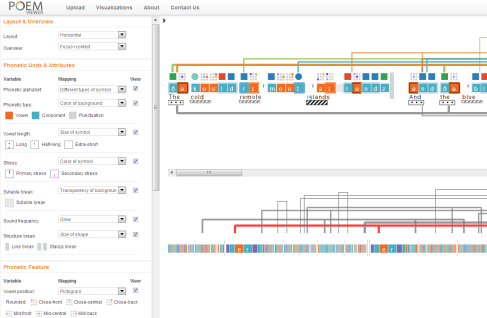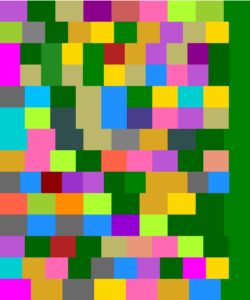Check out Poem Viewer project write-up and video on Jisc Inform / Issue 37, Summer 2013 | #jiscinform | The Diversity of data.
Poem Viewer – A web-based tool for visualizing poems in support of close reading.
In the Imagery Lenses for Visualizing Text Corpora project, we are working on developing a family of novel techniques for visualizing text corpora. Our project started at the beginning of April. Since then we have been exploring a range of visualization techniques, such as word networks, pixel-based visualization, and parallel coordinates. The datasets that we used range from the text collection in the British National Corpus to individual poems such as sonnets by Shakespeare and free-verse poems by Louise Bogan.
Imagery Lenses for Visualizing Text Corpora is a collaborative project between the University of Oxford and the University of Utah. Our team comprises of two poets, one linguist and three computer scientists.
In June 2012, the Utah colleagues visited us at Oxford, where we held a Workshop on Visualizing Texts, Documents, Corpora and Book History. The workshop was a meeting between the two fields of Digital Humanities and Visualization. The workshop started with a keynote speech by Professor Chris Johnson, a well-known visualization scientist. A panel of humanities scholars then presented a number of challenges in handling humanities data, including a collection of historical data about the first generation of European books, another dataset about ancient Islamic manuscripts, a collection of message records that encapsulate an ancient Chinese social network and the British National Corpus. This was followed by group discussions on each challenge. A panel of visualization researchers then presented possible visualization solutions to these challenges on behalves of individual discussion groups. The workshop concluded with ICE BLIND, a poetry reading by Professor Katharine Coles.
Since then the team have made good progress in developing novel methods for visualizing poems. Some of our initial results were presented at the Digital Humanities Forum 2012: “Big Data and Uncertainty in the Humanities”.
In Oxford, the Oxford team will visit the Utah colleagues, and we will use this opportunity to evaluate a prototype visualization system developed at Oxford.


